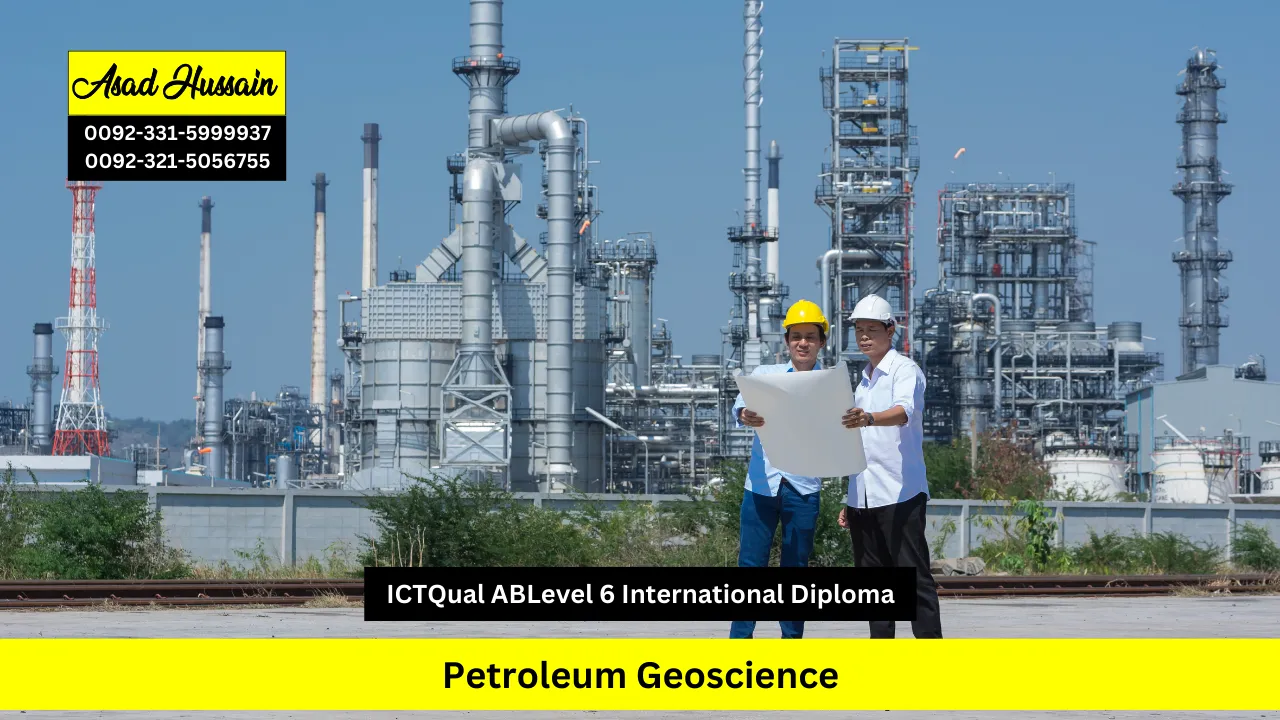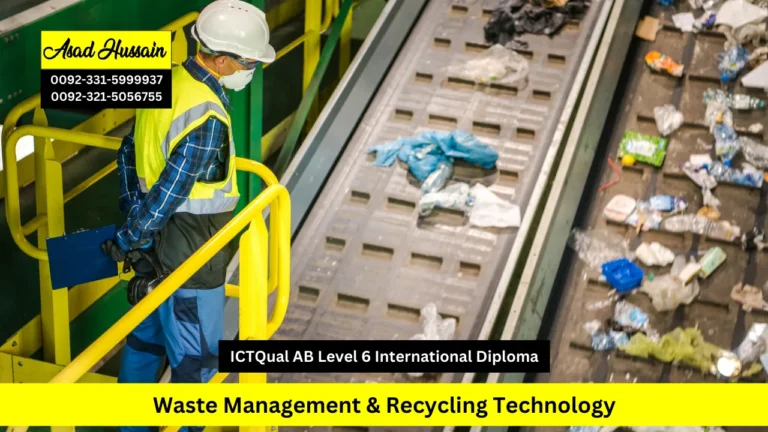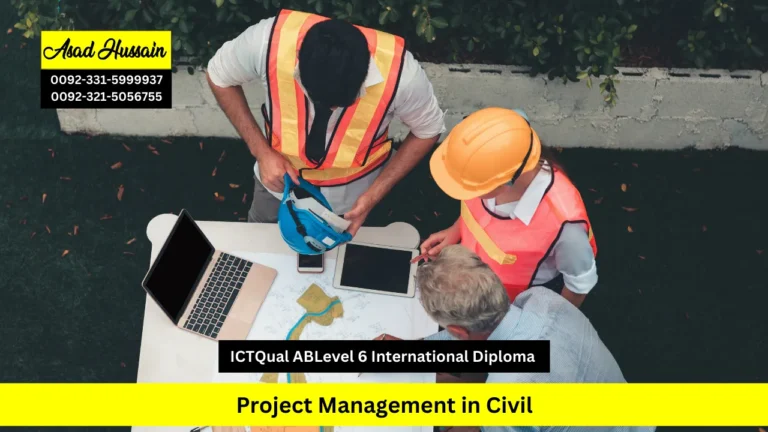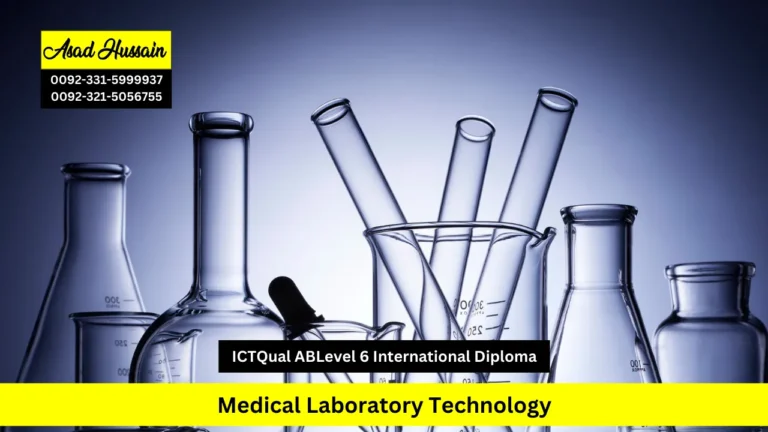The ICTQual AB Level 6 International Diploma in Petroleum Geoscience is designed to meet the growing global demand for professionals who can interpret and manage subsurface resources with precision. Petroleum geoscience plays a critical role in the exploration and production of oil and gas, combining advanced scientific knowledge with practical industry applications to ensure sustainable and efficient energy solutions.
ICTQual ABLevel 6 International Diploma in Petroleum Geoscience provides learners with an in-depth understanding of geological principles, petroleum system analysis, basin modeling, seismic interpretation, reservoir evaluation, and environmental considerations in exploration and development. The ICTQual ABLevel 6 International Diploma in Petroleum Geoscience also covers the latest digital tools, simulation techniques, and regulatory frameworks that shape modern petroleum geoscience practices.
Learners will gain expertise in analyzing geological data, assessing hydrocarbon potential, planning exploration programs, and ensuring compliance with international standards. Practical case studies, project-based learning, and real-world applications prepare graduates to work confidently in roles such as petroleum geoscientist, reservoir analyst, exploration specialist, or energy consultant.
By completing ICTQual ABLevel 6 International Diploma in Petroleum Geoscience, participants will not only strengthen their technical capabilities but also enhance their employability in a competitive industry. Whether you are a recent graduate, a career changer, or an experienced professional, the ICTQual AB Level 6 International Diploma in Petroleum Geoscience equips you with the knowledge, skills, and global recognition needed to succeed in the dynamic oil and gas sector.
Program Highlights
Study Units
Year 1 – Foundation in Petroleum Geoscience
- Principles of Geology and Earth Sciences
- Introduction to Petroleum Exploration
- Mineralogy and Petrology
- Sedimentology and Stratigraphy
- Geophysical Methods in Exploration
- Introduction to Reservoir Engineering
- Drilling Operations Fundamentals
- Petroleum Fluid Properties
- Geoscience Data Collection Techniques
- Health, Safety, and Environmental Awareness
- Scientific Report Writing
- Introduction to Geospatial Technology
Year 2 – Intermediate Petroleum Geoscience
- Structural Geology and Tectonics
- Advanced Sedimentary Basin Analysis
- Reservoir Characterisation and Modelling
- Petrophysics and Well Logging
- Seismic Interpretation and Geophysics
- Drilling Fluid and Wellbore Stability
- Production Systems and Flow Mechanics
- Hydrocarbon Exploration Techniques
- Risk Assessment and Project Management
- Environmental Impact and Sustainability
- GIS Applications in Petroleum Geoscience
- Technical Communication and Data Analysis
Year 3 – Advanced Petroleum Geoscience
- Advanced Reservoir Simulation
- Enhanced Oil Recovery Techniques
- Petroleum Economics and Project Evaluation
- Exploration Strategy and Field Development
- Advanced Geophysics and Seismic Modelling
- Subsurface Fluid Flow and Reservoir Dynamics
- Drilling Design and Well Planning
- Petroleum Laboratory Techniques
- Energy Transition and Sustainable Practices
- Research Methods in Geoscience
- Capstone Project in Petroleum Geoscience
- Professional Development and Leadership in Energy
Meeting the entry requirements for the ICTQual AB Level 6 International Diploma in Petroleum Geoscience ensures that learners are well-prepared to engage with the academic and professional standards of ICTQual ABLevel 6 International Diploma in Petroleum Geoscience. The requirements are designed to support diverse learners, from students to professionals, while maintaining the course’s high quality.
Age Requirements
- Learners must typically be 18 years or older at the time of enrollment in ICTQual ABLevel 6 International Diploma in Petroleum Geoscience.
- Applicants should demonstrate maturity, discipline, and commitment suitable for advanced-level studies.
Educational Requirements
- A minimum of a Level 5 qualification or equivalent diploma/degree in geology, geoscience, petroleum engineering, or a related field.
- Applicants with strong academic performance in Earth sciences or engineering subjects will be given preference.
Professional Experience
- Candidates with at least two years of relevant work experience in oil and gas exploration, geology, or related industries are encouraged to apply.
- Practical industry exposure may be considered in place of formal education for experienced professionals.
English Language Proficiency
- Learners must demonstrate proficiency in English reading, writing, and communication skills.
- Proof may include IELTS, TOEFL, or equivalent qualifications; alternatively, applicants may provide evidence of previous study or work in an English-medium environment.
The ICTQual AB Level 6 International Diploma in Petroleum Geoscience equips learners with advanced technical expertise in geosciences, petroleum exploration, and reservoir engineering. Graduates will develop critical analytical, operational, and leadership skills necessary for success in the oil and gas sector, while understanding environmental sustainability and energy transition practices.
Year 1 – Foundation in Petroleum Geoscience
Principles of Geology and Earth Sciences
- Understand fundamental geological concepts and Earth systems.
- Identify rock types, minerals, and geological structures.
- Apply geological principles to real-world exploration contexts.
Introduction to Petroleum Exploration
- Describe global petroleum systems and exploration techniques.
- Understand exploration workflows from prospecting to production.
- Apply basic exploration concepts in laboratory and simulation exercises.
Mineralogy and Petrology
- Identify and classify minerals and rock types.
- Analyze petrographic properties for exploration relevance.
- Conduct laboratory-based rock and mineral examinations.
Sedimentology and Stratigraphy
- Understand sedimentary processes and depositional environments.
- Analyze stratigraphic sequences to interpret subsurface geology.
- Apply knowledge to reservoir characterization studies.
Geophysical Methods in Exploration
- Understand seismic, magnetic, and gravity survey principles.
- Interpret geophysical data for exploration purposes.
- Apply geophysical techniques in practical exercises.
Introduction to Reservoir Engineering
- Understand reservoir types, properties, and fluid behavior.
- Analyze basic reservoir performance metrics.
- Apply foundational principles to exploration scenarios.
Drilling Operations Fundamentals
- Understand drilling processes, rigs, and operations.
- Identify well construction elements and equipment.
- Apply theoretical knowledge to simulated drilling exercises.
Petroleum Fluid Properties
- Analyze the physical and chemical properties of hydrocarbons.
- Apply fluid behavior understanding to exploration and production.
- Conduct laboratory measurements of fluid characteristics.
Geoscience Data Collection Techniques
- Collect and manage geological, geophysical, and reservoir data.
- Apply standard methods for field sampling and recording.
- Interpret data for preliminary exploration assessments.
Health, Safety, and Environmental Awareness
- Identify potential hazards in geoscience and petroleum operations.
- Apply safety protocols and environmental management principles.
- Ensure compliance with occupational and environmental regulations.
Scientific Report Writing
- Develop clear, structured technical and scientific reports.
- Present geological data and analysis professionally.
- Apply standard reporting formats for academic and industrial use.
Introduction to Geospatial Technology
- Understand GIS principles and geospatial data applications.
- Apply mapping techniques to exploration projects.
- Integrate geospatial tools in laboratory and field exercises.
Year 2 – Intermediate Petroleum Geoscience
Structural Geology and Tectonics
- Analyze structural formations and tectonic processes.
- Interpret fault, fold, and fracture systems for exploration purposes.
- Apply structural analysis to field and laboratory datasets.
Advanced Sedimentary Basin Analysis
- Study basin evolution, depositional environments, and petroleum systems.
- Analyze stratigraphy, lithology, and tectonic influences.
- Apply basin modeling techniques for exploration planning.
Reservoir Characterisation and Modelling
- Develop reservoir models integrating geological and petrophysical data.
- Evaluate reservoir properties and heterogeneity.
- Apply modeling software for reservoir performance simulation.
Petrophysics and Well Logging
- Interpret well logs to assess formation properties.
- Understand petrophysical parameters for reservoir evaluation.
- Apply analytical techniques to enhance subsurface understanding.
Seismic Interpretation and Geophysics
- Analyze seismic data for subsurface structure and stratigraphy.
- Apply geophysical principles to exploration decision-making.
- Conduct seismic interpretation exercises using industry-standard software.
Drilling Fluid and Wellbore Stability
- Understand drilling fluid design and selection principles.
- Evaluate wellbore stability and mitigation strategies.
- Apply theoretical knowledge in laboratory simulations.
Production Systems and Flow Mechanics
- Understand hydrocarbon production systems and multiphase flow.
- Analyze well and reservoir production behavior.
- Apply flow mechanics concepts to field and lab scenarios.
Hydrocarbon Exploration Techniques
- Apply exploration strategies for conventional and unconventional reservoirs.
- Integrate geological, geophysical, and engineering data for prospect evaluation.
- Conduct risk-based assessments of exploration opportunities.
Risk Assessment and Project Management
- Perform technical and operational risk assessments.
- Develop project plans and manage resource allocation.
- Apply project management tools to exploration and production operations.
Environmental Impact and Sustainability
- Evaluate environmental impacts of petroleum exploration and production.
- Apply sustainable practices to minimize operational footprints.
- Ensure compliance with environmental and regulatory standards.
GIS Applications in Petroleum Geoscience
- Use GIS for spatial analysis of subsurface and surface data.
- Apply mapping and geospatial visualization to exploration projects.
- Integrate GIS with other geoscience datasets for decision support.
Technical Communication and Data Analysis
- Present technical findings clearly and effectively.
- Conduct data analysis using statistical and computational tools.
- Apply evidence-based conclusions in technical reporting.
Year 3 – Advanced Petroleum Geoscience
Advanced Reservoir Simulation
- Develop and run sophisticated reservoir simulation models.
- Analyze fluid flow, pressure distribution, and recovery efficiency.
- Apply simulation outcomes to optimize production strategies.
Enhanced Oil Recovery Techniques
- Understand chemical, thermal, and gas injection EOR methods.
- Evaluate field applicability of different EOR techniques.
- Design pilot studies for reservoir performance improvement.
Petroleum Economics and Project Evaluation
- Conduct economic evaluations of exploration and production projects.
- Analyze investment feasibility, cost, and return metrics.
- Apply decision-making frameworks to project planning.
Exploration Strategy and Field Development
- Develop integrated exploration and development plans.
- Apply risk and resource assessment in field planning.
- Evaluate potential hydrocarbon reservoirs for commercial development.
Advanced Geophysics and Seismic Modelling
- Perform detailed seismic modelling and interpretation.
- Integrate geophysical data with reservoir and structural models.
- Apply geophysical insights to exploration and production optimization.
Subsurface Fluid Flow and Reservoir Dynamics
- Analyze reservoir fluid flow and pressure behavior.
- Model dynamic reservoir responses to production scenarios.
- Optimize reservoir management strategies based on simulation results.
Drilling Design and Well Planning
- Plan well trajectories and drilling programs.
- Integrate geological, geophysical, and engineering data.
- Apply safety, economic, and operational considerations in planning.
Petroleum Laboratory Techniques
- Conduct laboratory experiments on fluids, rocks, and reservoir samples.
- Analyze laboratory data to inform field and simulation models.
- Apply experimental findings to optimize exploration and production.
Energy Transition and Sustainable Practices
- Evaluate low-carbon energy integration in petroleum projects.
- Apply sustainable strategies for exploration and production.
- Incorporate climate-conscious practices in operational planning.
Research Methods in Geoscience
- Conduct independent research in petroleum geoscience.
- Apply quantitative and qualitative research methodologies.
- Prepare professional scientific reports and presentations.
Capstone Project in Petroleum Geoscience
- Execute a comprehensive project integrating technical and managerial knowledge.
- Analyze complex exploration or reservoir challenges.
- Present findings using industry-standard documentation and communication formats.
Professional Development and Leadership in Energy
- Develop leadership, decision-making, and project management skills.
- Apply professional ethics and sustainability principles in energy projects.
- Promote continuous professional growth in the petroleum sector.
Graduates of this programme will possess advanced geoscience knowledge, practical exploration and reservoir engineering skills, and leadership capabilities to excel in petroleum and energy sector roles worldwide.
The ICTQual AB Level 6 International Diploma in Petroleum Geoscience is designed for individuals who aim to build advanced expertise in petroleum geology, exploration, and drilling operations. This program attracts a diverse group of learners, from academic professionals to policymakers, all seeking to enhance their technical knowledge and practical application in the global oil and gas industry.
Educational Instructors and Trainers
- Ideal for instructors in geology, petroleum engineering, or related fields who wish to update their knowledge with the latest industry practices.
- Trainers can benefit from incorporating real-world exploration and drilling case studies into their teaching, enhancing the quality of academic and professional training programs.
Environmental Advocates and Activists
- Suitable for individuals focused on sustainable energy development and environmental protection in oil and gas operations.
- Equips advocates with the knowledge to evaluate the environmental impacts of exploration projects and promote eco-friendly solutions within the industry.
Students and Recent Graduates
- Perfect for graduates of geology, geoscience, or petroleum engineering programs who want to specialize in petroleum exploration and production.
- Provides learners with the practical skills and industry-ready knowledge required to transition smoothly into the energy sector.
Career Changers
- Designed for professionals from related technical backgrounds (engineering, mining, or energy) seeking to shift their careers into petroleum geoscience.
- Offers a structured pathway to gain globally recognized qualifications and practical expertise for new roles in exploration or drilling operations.
Policy Makers and Regulators
- Valuable for government officials and regulators involved in energy policy, compliance, and environmental regulations.
- Provides insights into legal frameworks, safety standards, and international practices that guide petroleum exploration and drilling projects.
The ICTQual AB Level 6 International Diploma in Petroleum Geoscience is well-suited to learners from a variety of professional, academic, and advocacy backgrounds. Whether you are training future geoscientists, ensuring regulatory compliance, advancing sustainable energy solutions, or beginning your career in oil and gas, this program equips you with the knowledge, practical skills, and global recognition needed to excel. By fostering an inclusive yet specialized learning environment, this diploma ensures every learner can align their goals with the dynamic needs of the petroleum industry.







